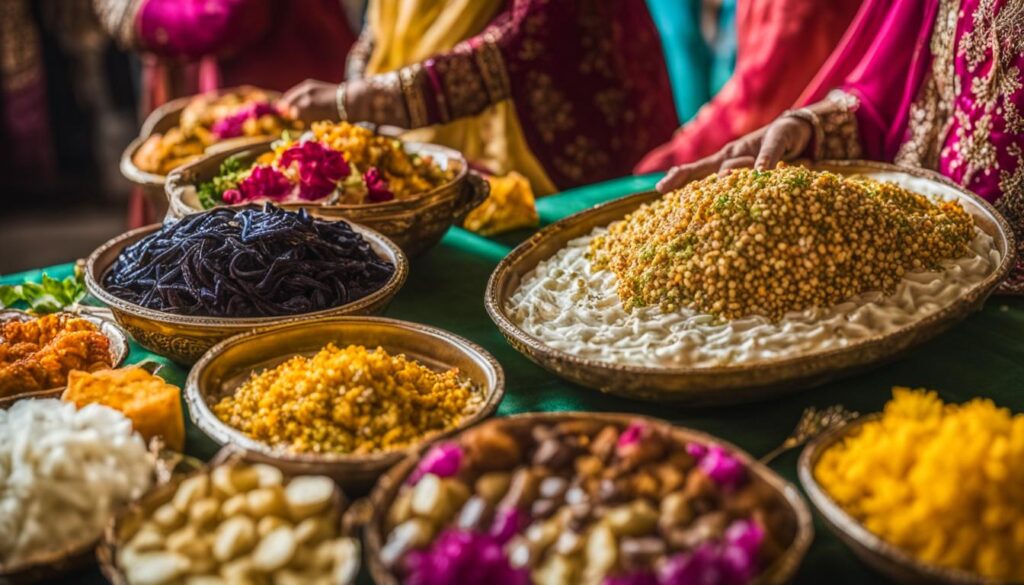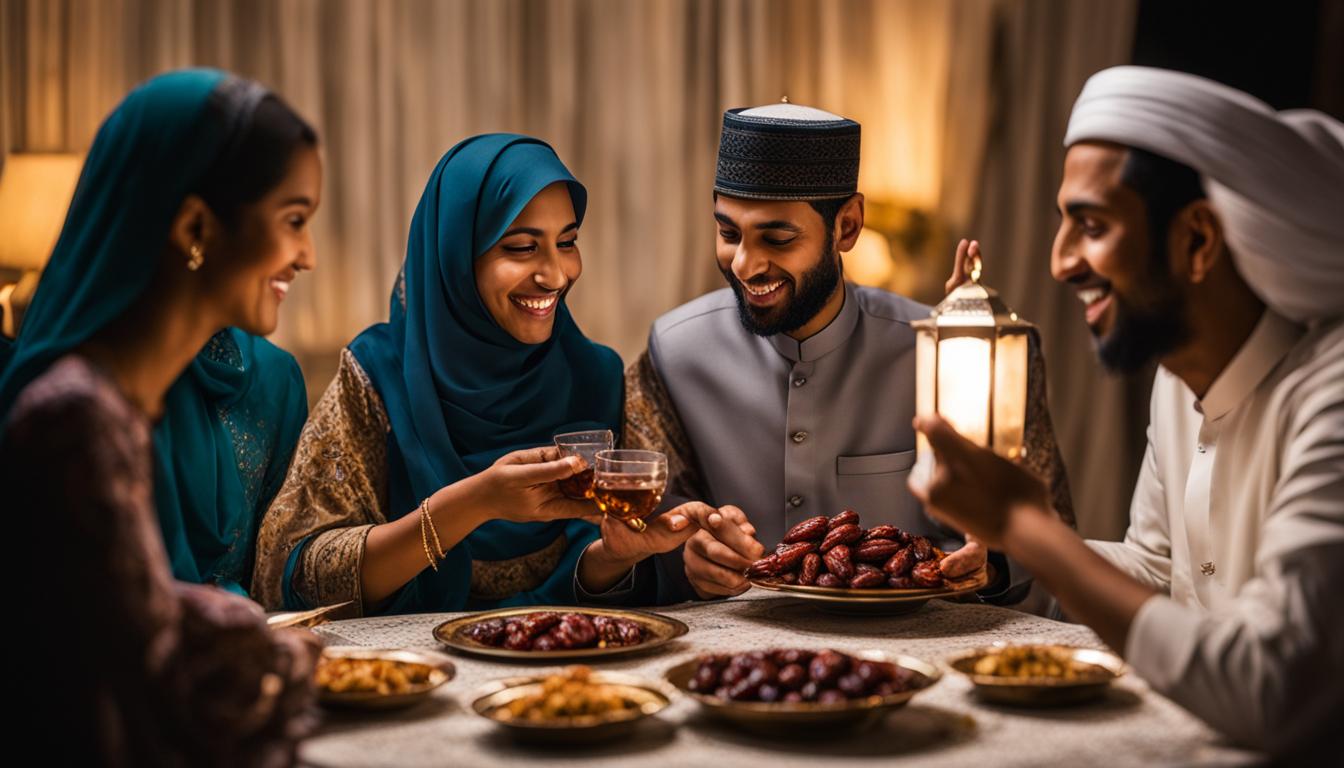Ramadan is the holiest and most anticipated Islamic holiday, observed by Muslims around the world. It is a time of fasting, spiritual reflection, and dedication to worshiping Allah. Greeting Muslims during Ramadan is considered a good gesture and a way to show gratitude towards family and friends. Sending Ramadan greetings is a cost-effective and convenient way to connect with loved ones, especially if you are unable to meet them in person. Online Ramadan greetings have become increasingly popular, allowing people to send heartfelt wishes to their Muslim friends and family.
Key Takeaways:
- Mastering how to greet a Muslim during Ramadan is a respectful way to show appreciation for their religious practices.
- Online Ramadan greetings are a convenient way to connect with loved ones during the holy month.
- Understanding the cultural etiquette associated with greeting Muslims during Ramadan is important to avoid any unintentional offense.
- Respecting the fasting practices of Muslims during Ramadan is crucial when greeting them.
- Greeting Muslims during Eid al-Fitr, the festival that marks the end of Ramadan, is another way to show inclusivity and respect.
Importance of Sending Ramadan Greetings
Sending Ramadan greetings holds immense significance during this holy month. It goes beyond a simple gesture of goodwill; it is a way to convey warm wishes and blessings for a prosperous celebration of Ramadan. By sending heartfelt greetings, individuals show respect for the traditions and culture of Muslims, fostering a sense of unity and solidarity within the community.
There are various ways to greet Muslims during Ramadan, but two common phrases are “Ramadan Mubarak” and “Ramadan Kareem.” These greetings express well wishes for a blessed and generous Ramadan. When sending Ramadan greetings, individuals can further enhance their messages with meaningful prayers or by sharing Islamic books as gifts, symbolizing love and appreciation for their Muslim friends and family.
Sending Ramadan greetings also helps strengthen relationships. It serves as a reminder that even when physically apart, loved ones are remembered and cherished during this sacred time. These greetings can be shared through various means, such as text messages, social media posts, or traditional cards. Regardless of the medium, the intention behind the greeting remains the same – to extend warm wishes and make the recipient feel valued and loved.
The Importance of Inclusivity
By sending Ramadan greetings, individuals demonstrate inclusivity and respect for diversity. It shows a willingness to learn about and appreciate different cultures and traditions. In a world that is increasingly interconnected, these gestures of goodwill contribute to fostering understanding, acceptance, and unity among people of various backgrounds and beliefs.
How to Get Best Ramadan Greetings 2023
Finding the best Ramadan greetings for 2023 can be a time-consuming task, especially if you are unable to meet your loved ones in person. Fortunately, the internet offers a convenient solution for finding the perfect Ramadan Kareem greetings that resonate with your family and friends.
Online collections of Ramadan greetings and happy Ramadan wishes can be easily accessed, allowing you to share heartfelt greetings and make your Ramadan celebrations even more special. Whether you are looking for traditional greetings or contemporary messages, the vast selection available online ensures that you can find the best greetings for Muslims in Ramadan 2023.
By utilizing these online resources, you can save time and effort while still expressing your love and appreciation for your Muslim friends and family. So, take advantage of the power of the internet and find the best Ramadan greetings for 2023 to make this holy month even more meaningful.
Ramadan Greetings and Traditions
Ramadan greetings hold significant importance in the celebration of the holy month. Two common traditional greetings used during Ramadan are “Ramadan Mubarak” and “Ramadan Kareem.” These heartfelt greetings convey well wishes for a happy and generous Ramadan. Muslims cherish these greetings as they reflect blessings and express warmth towards one another. It is important to understand and respect these greetings when engaging with Muslims during Ramadan.
Alongside greetings, Muslims observe various traditions during Ramadan. Fasting is the central aspect of this holy month, where Muslims abstain from food and drink from dawn to dusk. Fasting serves as an act of self-discipline, spiritual reflection, and empathy towards those who are less fortunate. Additionally, Muslims practice zakat, which involves giving to charity and helping those in need. Decorating homes with Ramadan-themed decorations is also a common tradition, symbolizing the festive spirit of the occasion.
When greeting Muslims during Ramadan, it is crucial to acknowledge and respect these traditions. Understanding the significance of fasting, the act of charity, and the cultural practices associated with Ramadan demonstrates genuine respect and appreciation for their religious observance. By embracing these traditions and engaging in respectful conversations, individuals can foster stronger connections and promote inclusivity within the community.
To summarize, Ramadan greetings play a vital role in the celebration of Ramadan, conveying well wishes and blessings. Understanding and respecting the traditions of fasting, charity, and home decorations associated with Ramadan is crucial when greeting Muslims during this holy month. By embracing these customs and engaging in respectful conversations, individuals can show respect and foster a sense of inclusivity during Ramadan.
Fasting During Ramadan
Fasting is a central aspect of Ramadan, where Muslims abstain from food and drink from dawn to dusk. This practice serves as a means of self-discipline, spiritual reflection, and empathy towards those who are less fortunate. During this holy month, it is essential to be aware of the fasting practices when greeting Muslims to show genuine respect and appreciation for their dedication.
When interacting with Muslims who are fasting during Ramadan, it is important to be mindful of their commitment and avoid offering food or drinks during daylight hours. Understanding the significance of fasting and the effort that goes into it allows us to be respectful and supportive of their religious observance. Instead of focusing on food-related conversations, it is best to offer words of encouragement and express admiration for their dedication.
Additionally, it is important to be mindful of the timing when scheduling events or meetings with Muslim colleagues, friends, or family members during Ramadan. Being considerate of their fasting schedule and avoiding unnecessary interruptions during the fasting hours demonstrates empathy and understanding.
Respectful Ways to Greet Muslims During Ramadan
- Use appropriate greetings such as “Ramadan Mubarak” or “Ramadan Kareem” to convey blessings for a joyful and blessed Ramadan.
- Show empathy and understanding towards their fasting practice by being respectful and avoiding discussions about food and drink during daylight hours.
- Express admiration for their commitment and dedication to fasting as a way to deepen their spiritual connection and show gratitude.
- Avoid scheduling meetings or events during fasting hours and be mindful of the timing when planning activities with Muslim friends, colleagues, or family members.
- Offer words of encouragement and support to uplift their spirits during this holy month.
By being sensitive and respectful of the fasting practices during Ramadan, we can foster a sense of inclusivity and strengthen our relationships with Muslim friends, colleagues, and family members. Understanding the significance of fasting and acknowledging their commitment demonstrates genuine respect and appreciation for their religious beliefs and traditions.
Eid al-Fitr – The Festival of Breaking the Fast
Eid al-Fitr, also known as the Festival of Breaking the Fast, is a joyous celebration that marks the end of Ramadan. It is a time of gratitude, feasting, and reconnecting with loved ones. Muslims around the world come together to celebrate this special occasion, reflecting on their spiritual journey during the holy month.
During Eid al-Fitr, families gather for festive meals, exchange gifts, and engage in acts of charity. It is a time of unity and generosity, as Muslims extend their blessings to those in need. The festival is characterized by vibrant decorations, traditional attire, and lively community events.
To greet Muslims during Eid al-Fitr, it is customary to say “Eid Mubarak,” which translates to “Blessed Eid.” This simple phrase conveys warm wishes and acknowledges the significance of the occasion. It is important to approach greetings with respect and cultural understanding, ensuring that Muslims feel appreciated and valued during this festive time.

Traditions of Eid al-Fitr
- Prayer: Muslims begin the day with a special prayer called Salat al-Eid. This congregational prayer is held at mosques or outdoor prayer grounds and brings the community together.
- Charity: Zakat al-Fitr, a form of charitable giving, is an important tradition during Eid al-Fitr. Muslims donate to the less fortunate, ensuring that everyone can partake in the festivities.
- Feasting: Sumptuous meals are prepared, featuring traditional dishes and delicacies. Families and friends come together to share the joy of Eid, exchanging stories and laughter.
Etiquette in Greeting Muslims during Eid al-Fitr
- Offer heartfelt greetings: When greeting Muslims during Eid al-Fitr, express sincere wishes for a blessed and joyous celebration. Use phrases like “May your Eid be filled with happiness and peace.”
- Practice inclusivity: Extend greetings to Muslims from different cultures and backgrounds, recognizing and respecting the diversity within the Muslim community.
- Be mindful of cultural customs: Remember that physical contact, such as hugs or handshakes, may not be appropriate for all Muslims. Respect personal boundaries and opt for verbal greetings if unsure.
Conclusion
Greeting Muslims during Ramadan is an essential way to show respect and appreciation for their religious practices and traditions. By understanding the proper greetings for Muslims during Ramadan, individuals can navigate the customs and traditions of the holiday with grace and sensitivity.
Sending the best greetings for Muslims in Ramadan is not only a way to convey warm wishes and blessings, but also to strengthen relationships and foster a sense of community. By respecting cultural etiquette and using respectful ways to greet Muslims during Ramadan, individuals can build stronger connections with their Muslim friends and family.
Whether it’s the traditional Ramadan greetings of “Ramadan Mubarak” or “Ramadan Kareem,” or heartfelt wishes shared through online platforms, the act of greeting Muslims during Ramadan is a cost-effective and convenient way to connect with loved ones, especially if physical meetings are not possible.
Ultimately, mastering how to greet a Muslim during Ramadan is a way to show gratitude towards family and friends, and to participate in the joyous celebrations of the holy month. By embracing the rich traditions and culture of Ramadan, individuals can contribute to a more inclusive and harmonious society.
FAQ
How do you greet a Muslim during Ramadan?
It is appropriate to greet Muslims during Ramadan by saying “Ramadan Mubarak” or “Ramadan Kareem,” which convey well wishes for a happy and generous Ramadan.
Why is sending Ramadan greetings important?
Sending Ramadan greetings is a way to show respect and appreciation for the religious practices and traditions of Muslims. It helps strengthen relationships and fosters a sense of community.
How can I find the best Ramadan greetings?
You can find a collection of Ramadan greetings and happy Ramadan wishes online, making it easier to share heartfelt greetings with your family and friends during the holy month.
What are some Ramadan traditions associated with greetings?
Two traditional Ramadan greetings commonly used are “Ramadan Mubarak” and “Ramadan Kareem.” It is important to understand and respect these greetings, as well as other traditions such as fasting and zakat (charity).
What should I know about fasting during Ramadan when greeting Muslims?
Fasting is a central aspect of Ramadan, where Muslims abstain from food and drink from dawn to dusk. Being respectful and understanding of their dedication and commitment to fasting is crucial in showing genuine respect and appreciation.
What is Eid al-Fitr and how does it relate to greeting Muslims during Ramadan?
Eid al-Fitr, also known as the Festival of Breaking the Fast, is the grand celebration that marks the end of Ramadan. Understanding and participating in the festivities of Eid al-Fitr is another way to show respect and inclusivity when greeting Muslims during Ramadan.

